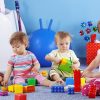![Play! Written by Elizabeth Vandentoorn, Parent Educator, Early Childhood, Calhoun Area Intermediate School District Play is serious learning! Every time your child plays, her brain is continuously making new connections that help her development. Your home is full of free or inexpensive items to create everyday activities you can do with your child to support […]](https://helpmegrowcalhoun.org/wp-content/uploads/2020/06/shutterstock_710812957.jpg)
Written by Elizabeth Vandentoorn, Parent Educator, Early Childhood, Calhoun Area Intermediate School District
Play is serious learning! Every time your child plays, her brain is continuously making new connections that help her development.
Your home is full of free or inexpensive items to create everyday activities you can do with your child to support his development and help him stay on track. Here you will find some examples along with their developmental impact.
Social Emotional-Play reduces stress and promotes building attachment with your child. Playing with others teaches your child sharing, empathy, cooperation, helping, and builds her self esteem. Follow your child’s lead so she knows her ideas have value and encourage your child to problem-solve on her own. Plan a picnic!
You can have an indoor picnic on a towel, or take it outside if the weather is appropriate. Allow your child to choose foods, providing a variety of healthy options. Allow your child to choose the picnic spot and help you layout the towel or blanket and set up your picnic. Turn off technology distractions and enjoy making memories with your child. Encourage your child to clean up! Invite your child to be involved throughout the entire process.
Motor- Exploring with his body helps your child strengthen his large and small muscles. Repetition helps build your child’s coordination.
Make a racquet!
Tape a paper plate, color it if desired, to a long spoon, paint stirrer, or paper towel tube. Make a ball of rolled-up newspaper, rolled up socks, or use a balloon. Practice hitting the “ball” with your racquet, back and forth on the floor, or in the air. Use yarn to hang the “ball” from a door frame to swing at; try different heights so your child needs to jump! What other games can you create?
Language- When your child is surrounded by the language, she will learn and understand more words.
Parallel talk!
Describe for your child what you see him doing. “Your red car is driving fast! Vroom, vroom!”
Self-talk!
Describe for your child what you are doing as you go about your day to day activities. “I am going to put on my black socks today, they’re soft and warm.”
Cognitive- As your child explores his world he is discovering cause and effect, problem-solving, and trial and error. Playing allows your child to develop important skills for success in school like persistence, memory, and ability to focus.
Stacking and Nesting!
Don’t throw your food containers away! Allow your child to explore with washed containers or cups, using trial and error as he stacks them or fits them together. Observe your child and wait to see what he will do with the containers. Hide an object under a container and see if your child can remember which container is hiding the item. Talk about sizes, line the containers up according to size.
READ– It is never too early to read to your child.
Model reading; so your child sees you reading.
Keep lots of books available in your home; visit your library.
Hold your child while you read; He loves being close to you!
Point to the pictures and talk about them; you don’t have to read the words.
Read favorite books over and over; it helps your child’s brain develop.
Grown-ups are busy! Give yourself some grace, aim for quality time with your child, not quantity.
Get outside! Playing outside in all types of weather is beneficial for you and your child.
![¡Jugar! Escrito por Elizabeth Vandentoorn, Educadora de Padres, Primera Infancia, Distrito Escolar Intermedio del Área de Calhoun ¡Jugar es un aprendizaje serio! Cada vez que su hijo juega, su cerebro está continuamente haciendo nuevas conexiones que ayudan a su desarrollo. Su hogar está lleno de artículos gratuitos o de bajo costo para crear actividades cotidianas que […]](https://helpmegrowcalhoun.org/wp-content/uploads/2020/06/shutterstock_710812957.jpg)
Escrito por Elizabeth Vandentoorn, Educadora de Padres, Primera Infancia, Distrito Escolar Intermedio del Área de Calhoun
¡Jugar es un aprendizaje serio! Cada vez que su hijo juega, su cerebro está continuamente haciendo nuevas conexiones que ayudan a su desarrollo.
Su hogar está lleno de artículos gratuitos o de bajo costo para crear actividades cotidianas que puede hacer con su hijo para apoyar su desarrollo y ayudarlo a mantenerse en el camino. Aquí encontrará algunos ejemplos junto con su impacto en el desarrollo.
El juego social y emocional reduce el estrés y promueve el vínculo con su hijo. Jugar con otros le enseña a su hijo a compartir, empatía, cooperación, ayuda y desarrolla su autoestima. Siga el ejemplo de su hijo para que sepa que sus ideas tienen valor y aliente a su hijo a resolver sus propios problemas. ¡Planea un picnic!
Puede hacer un picnic bajo techo con una toalla, o llevarlo afuera si el clima es apropiado. Permita que su hijo elija alimentos, proporcionando una variedad de opciones saludables. Permita que su hijo elija el lugar de picnic y lo ayude a diseñar la toalla o la manta y a organizar su picnic. Apague las distracciones tecnológicas y disfrute haciendo recuerdos con su hijo. ¡Anime a su hijo a limpiar! Invite a su hijo a participar durante todo el proceso.
La exploración motora con su cuerpo ayuda a su hijo a fortalecer sus músculos grandes y pequeños. La repetición ayuda a construir la coordinación de su hijo.
¡Haz una raqueta!
Pegue un plato de papel, coloréelo si lo desea, en una cuchara larga, un agitador de pintura o un tubo de toalla de papel. Haga una bola de periódico enrollado, calcetines enrollados o use un globo. Practique golpear la “pelota” con su raqueta, de un lado a otro en el piso o en el aire. Use hilo para colgar la “bola” del marco de la puerta para balancearse; ¡pruebe diferentes alturas para que su hijo necesite saltar! ¿Qué otros juegos puedes crear?
Idioma: cuando su hijo esté rodeado del idioma, aprenderá y comprenderá más palabras.
¡Charla paralela!
Describa para su hijo lo que ve que hace. “¡Tu auto rojo conduce rápido! ¡Rugido del motor!”
¡Charla con uno mismo!
Describa para su hijo lo que está haciendo a medida que realiza sus actividades diarias. “Hoy me pondré los calcetines negros, son suaves y cálidos”.
Cognitivo: a medida que su hijo explora su mundo, está descubriendo causa y efecto, resolución de problemas y prueba y error. Jugar le permite a su hijo desarrollar habilidades importantes para el éxito en la escuela, como la persistencia, la memoria y la capacidad de concentración.
¡Apilamiento y anidamiento!
¡No tires tus envases de comida! Permita que su hijo explore con recipientes o tazas lavados, usando prueba y error mientras los apila o los une. Observe a su hijo y espere a ver qué hará con los contenedores. Esconda un objeto debajo de un contenedor y vea si su hijo puede recordar qué contenedor está ocultando el artículo. Hable sobre tamaños, alinee los contenedores según el tamaño.
LEA- Nunca es demasiado temprano para leerle a su hijo.
Lectura modelo; para que su hijo lo vea leyendo.
Mantenga muchos libros disponibles en su hogar; Visita tu biblioteca.
Sostenga a su hijo mientras lee; ¡Le encanta estar cerca de ti!
Señale las imágenes y hable sobre ellas; no tienes que leer las palabras.
Lee libros favoritos una y otra vez; ayuda a desarrollar el cerebro de su hijo.
¡Los adultos están ocupados! Dése un poco de gracia, busque tiempo de calidad con su hijo, no cantidad.
¡Sal afuera! Jugar afuera en todo tipo de clima es beneficioso para usted y su hijo.






